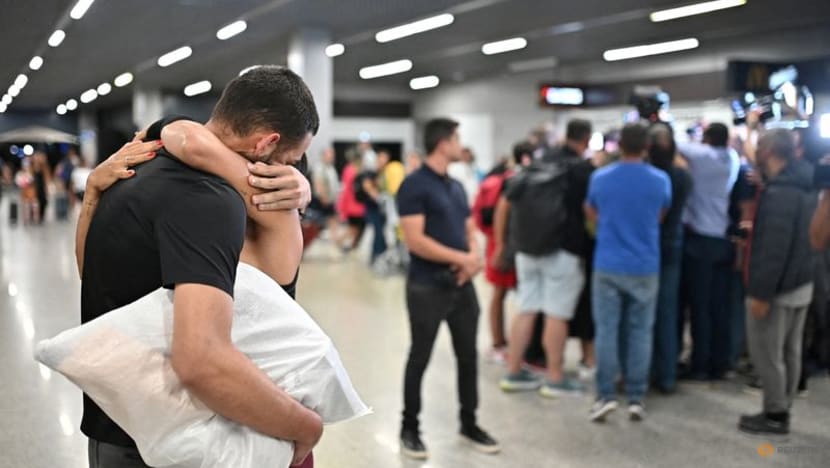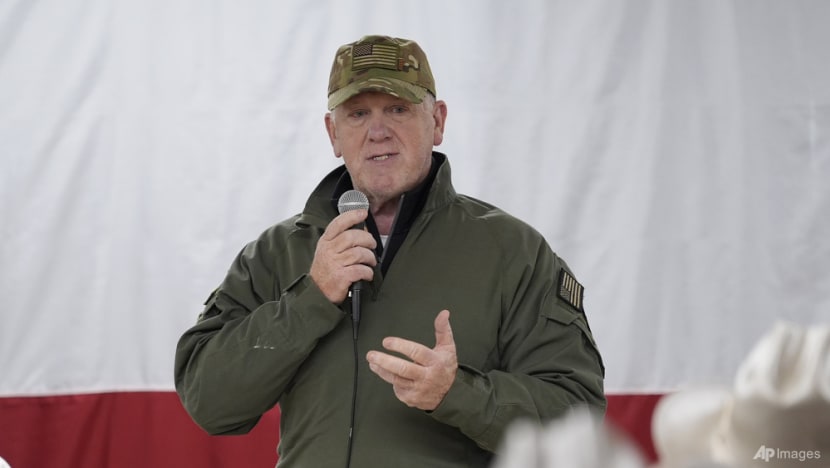What we know about Trump’s mass deportation plan and its impact on Latin America

A Brazilian migrant, deported from the US under President Donald Trump's administration, is welcomed by his relative at the Confins airport in Belo Horizonte, Brazil, Jan 25, 2025. (Photo: REUTERS/Washington Alves)
On his first day in office, US President Donald Trump made good on his campaign pledges by announcing a series of border-related policies in an effort to crack down on illegal immigration.
Key to that is a promise of mass deportations. Hundreds of migrants in the US have been arrested and flown out of the country. More will follow.
This has put the US on a potential collision course with governments in Latin America, the original home of most of the United States' estimated 11 million undocumented migrants.
On Sunday (Jan 26), Trump announced sweeping tariffs and sanctions against Colombia for refusing to accept deportation flights, only to roll back those threats when the South American nation backed down.
WHAT IS TRUMP’S DEPORTATION PLAN?
Trump has said his administration will first target undocumented migrants who are criminals before turning to others without legal status.
Overseeing this effort is his "border czar" Tom Homan, the former head of the US Immigration and Customs Enforcement (ICE) who on Sunday defended raiding churches and schools as part of a crackdown on illegal immigration.
Homan views Chicago as "ground zero" of the deportation push.
ICE announced Sunday that it had joined five other federal agencies in "enhanced targeted operations" in Chicago "to enforce US immigration law and preserve public safety and national security by keeping potentially dangerous criminal aliens out of our communities".
According to CNN, immigration enforcement actions were also reported in the Atlanta area, Colorado, Los Angeles and Austin, Texas.
The Washington Post reported that Trump has been unhappy with the number of arrests so far and has directed federal immigration officials to meet higher detention quotas. Citing people with knowledge of internal briefings, the report said Trump was ordering ICE to raise the arrest numbers from a few hundred a day to at least 1,200 to 1,500.
Homan called on Congress to pass additional funding for dealing with those arrested.
"We're gonna need more ICE beds, a minimum of 100,000," he told ABC News.

HOW IT DIFFERS FROM PAST ADMINISTRATIONS
Trump’s approach to deportation is a sharp departure from previous administrations.
Under President Obama, for instance, immigration officials primarily targeted undocumented migrants who had committed a crime.
Trump, however, has broadened the scope, targeting anyone without documentation.
The Trump administration has also rescinded guidance from his Democratic predecessor Joe Biden that had limited immigration arrests near schools, churches and other sensitive places.
"This action empowers the brave men and women in CBP (US Customs and Border Protection) and ICE to enforce our immigration laws and catch criminal aliens - including murderers and rapists - who have illegally come into our country. Criminals will no longer be able to hide in America’s schools and churches to avoid arrest,” the Department of Homeland Security said in a statement on Tuesday.
While previous US governments also routinely carried out deportations, the Trump administration has begun using military aircraft as part of the Pentagon's response to Trump's national emergency declaration on immigration.
WHO IS AT RISK OF BEING DEPORTED?
Nearly half of the immigrants in the US illegally in 2022 came from Mexico, amounting to 4.8 million of 11 million overall, according to a US Department of Homeland Security report.
Other top countries were Guatemala, El Salvador and Honduras.
Those at imminent risk of deportation are foreigners who have already been ordered out of the country by a federal immigration judge. An estimated 1.4 million people have pending deportation orders, Bloomberg reports.
Acting Homeland Security Secretary Benjamine Huffman said in a memo made public on Friday that immigration officials could also consider whether to strip temporary legal status from migrants who entered through former President Joe Biden's signature "parole" programmes.
These programmes, which provided legal pathways for about 1.5 million migrants, ended on Monday.
IMPACT ON LATIN AMERICAN COUNTRIES
Trump’s hardline policies have strained relationships with some Latin American nations.
While some countries including Guatemala have accepted military deportation flights, Trump has faced resistance from Colombia's President Gustavo Petro, elected in 2022 as the first left-wing leader of Latin America's fourth-largest economy.
"The United States cannot treat Colombian migrants as criminals. I forbid entry to our territory to US planes carrying Colombian migrants," Petro wrote earlier on X.
He said he was ready to allow civilian US flights carrying deported migrants to land, as long as those aboard were not treated "like criminals".
By threatening sanctions on Colombia for refusing deportation flights, the US president is sending a signal to Latin American countries, especially Mexico, that failure to cooperate with US migrant deportations will result in retaliatory measures.
"Colombia is not the United States’ main trading partner and the asymmetries are enormous. The US economy is much bigger than the Colombian and doesn’t depend on the Colombian economy," said George Mason University Professor Guadalupe Correa-Cabrera.
"Obviously, there’s an important trade relationship but Trump can do this in order to pressure Colombia and also as a message to other countries, particularly to Mexico. Because with Mexico, he will impose measures regarding migration and he’s saying, ‘Listen Mexico, because this is what’s going on in Colombia."
Brazil has voiced outrage over the treatment by the Trump administration of dozens of Brazilian migrants deported back to their country on Friday.
The migrants, who were deported under a bilateral agreement predating Trump's return, were handcuffed on the flight, in what Brazil called "flagrant disregard" for their basic rights.
The president of Honduras, Xiomara Castro, called for an urgent meeting of leaders from the Community of Latin American and Caribbean States (CELAC) to take place on Thursday to discuss migration following the latest US moves.













